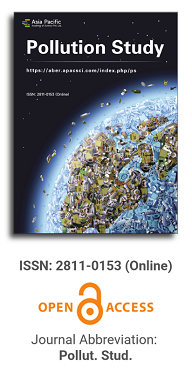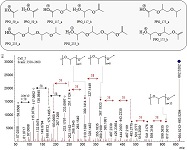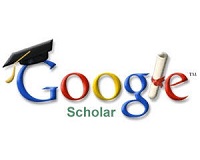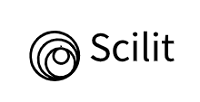
Asia Pacific Academy of Science Pte. Ltd. (APACSCI) specializes in international journal publishing. APACSCI adopts the open access publishing model and provides an important communication bridge for academic groups whose interest fields include engineering, technology, medicine, computer, mathematics, agriculture and forestry, and environment.

The (partial) replacement of synthetic polymers with bioplastics is due to increased production of conventional packaging plastics causing for severe environmental pollution with plastics waste. The bioplastics, however, represent complex mixtures of known and unknown (bio)polymers, fillers, plasticizers, stabilizers, flame retardant, pigments, antioxidants, hydrophobic polymers such as poly(lactic acid), polyethylene, polyesters, glycol, or poly(butylene succinate), and little is known of their chemical safety for both the environment and the human health. Polymerization reactions of bioplastics can produce no intentionally added chemicals to the bulk material, which could be toxic, as well. When polymers are used to food packing, then the latter chemicals could also migrate from the polymer to food. This fact compromises the safety for consumers, as well. The scarce data on chemical safety of bioplastics makes a gap in knowledge of their toxicity to humans and environment. Thus, development of exact analytical protocols for determining chemicals of bioplastics in environmental and food samples as well as packing polymers can only provide warrant for reliable conclusive evidence of their safety for both the human health and the environment. The task is compulsory according to legislation Directives valid to environmental protection, food control, and assessment of the risk to human health. The quantitative and structural determination of analytes is primary research task of analysis of polymers. The methods of mass spectrometry are fruitfully used for these purposes. Methodological development of exact analytical mass spectrometric tools for reliable structural analysis of bioplastics only guarantees their safety, efficacy, and quality to both humans and environment. This study, first, highlights innovative stochastic dynamics equations processing exactly mass spectrometric measurands and, thus, producing exact analyte quantification and 3D molecular and electronic structural analyses. There are determined synthetic polymers such as poly(ethylenglycol), poly(propylene glycol), and polyisoprene as well as biopolymers in bags for foodstuffs made from renewable cellulose and starch, and containing, in total within the 20,416–17,495 chemicals per sample of the composite biopolymers. Advantages of complementary employment in mass spectrometric methods and Fourier transform infrared spectroscopy is highlighted. The study utilizes ultra-high resolution electrospray ionization mass spectrometric and Fourier transform infrared spectroscopic data on biodegradable plastics bags for foodstuffs; high accuracy quantum chemical static methods, molecular dynamics; and chemometrics. There is achieved method performance |r| = 0.99981 determining poly(propylene glycol) in bag for foodstuff containing 20,416 species and using stochastic dynamics mass spectrometric formulas. The results highlight their great capability and applicability to the analytical science as well as relevance to both the fundamental research and to the industry.
Contamination of water resources as a starting point for socio-scientific activism
Vol 4, Issue 1, 2023
Download PDF
Abstract
Science curricula emphasize the need to involve students in civil society issues related to science, highlighting the primacy of learning about the science-technology-society-environment relationship. The objective of this work is to know the students' learning when they get involved in the attempt to solve the problem related to the pollution of the stream near their school. The research methodology is qualitative, interpretative and based on participant observation. Twenty-one students from two 8th grade classes with an alternative curriculum, living in a rural environment in southwestern Portugal, participated in the study. Data were collected through the teacher's diary, written documents and interviews with the students (conducted at the final of the study). The results reveal that the positive experiences provided by the radio club gave them confidence and encouraged them to engage in community activism related to the pollution of the local stream. This activism takes the form of a puppet show about sewage treatment. Also, the results show us that activism leads students to the identification of the science and technology issues that are at the root of the pollution of the creek, expanding their knowledge about the problem and discussing different perspectives for its solution. In addition, young people recognize that knowledge enables them to inform other members of the community and realize that they have the right to become involved in socio-scientific issues that affect their quality of life.
Keywords
References
- Colucci-Gray L, Camino E. From Knowledge to Action? Re-embedding Science Learning Within the Planet’s Web. In: Activism in science and technology education. London: Springer; 2014.
- Little PC. Negotiating Community Engagement and Science in the Federal Environmental Public Health Sector. Medical Anthropology Quarterly. 2009; 23(2): 94-118. doi: 10.1111/j.1548-1387.2009.01049.x
- Goldstein D. Fukushima in Brazil: undone science, techno philia, epistemic murk. Culture, Heory and Critique. 2017; 1-22. doi: 10.1080/14735784.2017. 1357480
- Aikenhead G. Towards a cultural view on quality science teaching. In: Corrigan D, Dillon J, Gunstone R (editors). T⅛e Professional Knowledge Base of Science Teaching. Springer, Dordrecht; 2011. doi: 10.1007/978-90-481-3927-9_7
- NRC. A framework for K-12 science education: Practices, crosscutting concepts, and core ideas. Committee on a conceptual framework for new K-12 science education standards. Board on science education, division of behavioral and social sciences and education. Washington, DC: ¾e National Academies Press; 2010.
- NGSS. Next Generation Science Standards: For states, by states. Washington, DC: ¾e National Academies Press; 2013.
- Osborne J, Dillon J. Science education in Europe: Critical reflections. A report to the Nuffield Foundation. London: King’s College London; 2008.
- North American Association for Environmental Education. Excellence in environmental education: Guidelines for learning (Pre-K-12). Available online: http://www.naaee.org/npeee/learner_guidelines.php (accessed on 19 May 2020).
- Freire S, Faria C, Galvão C, et al. New Curricular Material for Science Classes: How Do Students Evaluate It? Research in Science Education. 2011; 43(1): 163-178. doi: 10.1007/s11165-011-9247-0
- Simon S, Amos R. Decision making and use of evidence in a socioscientific problem on air quality. In: Sadler TD (editor). Socio-scientificIssues in the Classroom. London: Springer; 2011. pp. 167-192.
- Puig B, Jiménez-Aleixandre MP. Different music to the same score: Teaching about genes, environment, and human performances. In: Sadler TD (editor). Socio-scientific Issues in the Classroom. London: Springer; 2011. pp. 201-238.
- Dawson V. A case study of the impact ofi Socio-scientific issues into a reproduction unit in a catholic girls’ school. In: Socio-scientific Issues in the Classroom. London: Springer; 2011. pp. 313-346.
- Evagorou M. Discussing a socioscientific issue in a primary school classroom: ¾e case of using a technology- supported environment in formal and nonformal settings. In: Sadler TD (editor). Socioscientific Issues in the Classroom. London: Springer; 2011. pp. 133-160.
- Sadler T, Klosterman M, Topcu M. Learning science content and socioscientific reasoning through classroom explorations of global climate change. In: Sadler TD (editor). Socio-scientific Issues in the Classroom. London: Springer; 2011. pp. 45-78.
- Apotheker J, Blonder R, Akaygun S, et al. Responsible Research and Innovation in secondary school science classrooms: experiences from the project Irresistible. Pure and Applied Chemistry. 2016; 89(2): 211-219. doi: 10.1515/pac-2016-0817
- Reis P, Galvão C. Socio‐scientific controversies and students’ conceptions about scientists. International Journal of Science Education. 2004; 26(13): 1621-1633. doi: 10.1080/0950069042000205413
- Zeidler D, Applebaum S, Sadler T. Enacting a socioscientific issues classroom: Transformative transformations. In: Sadler TD (editor). Socioscientific Issues in the Classroom. London: Springer; 2011. pp. 277-306.
- Eastwood J, Schlegel W, Cook K. Effects of an interdisciplinary program on students’ reasoning with socioscientific issues and perceptions of their learning experiences. In: Sadler TD (editor). Socioscientific Issues in the Classroom. London: Springer; 2011. pp. 89-126.
- Stradling R. Controversial issues in the curriculum. Bulletin of Environmental Education. 1985; 170: 9-13.
- Stawkowski ME. “I am a radioactive mutant”: Emergent biological subjectivities at Kazakhstan’s Semipalatinsk Nuclear Test Site. American Ethnologist. 2016; 43(1): 144-157. doi: 10.1111/amet.12269
- Oulton C, Dillon J, Grace MM. Reconceptualizing the teaching of controversial issues. International Journal of Science Education. 2004; 26(4): 411-423. doi: 10.1080/0950069032000072746
- Wong S, Zeidler D, Klosterman M. Metalogue: Preconditions and resources for productive socioscientific issues teaching and learning. In: Sadler TD (editor). Socio-scientificIssues in the Classroom. London: Springer; 2011. pp. 271-276.
- Linhares E, Reis P. Promoting activism among future teachers through discussion of socially topical issues (French). Revue Francophone du Dévelopment Durable. 2014; 4: 80-93.
- Reis P. Promoting students’ collective socio-scientific activism: Teacher’s perspectives. In: Alsop S, Bencze L (editors). Activism in science and technology education. London: Springer; 2014. pp. 547-574.
- Reis P. Socio-political action on socio-scientific issues: reconstructing teacher education and curriculum. Uni-Pluri/versidad. 2014; 14(2), 16-26.
- Alsop S, Bencze L. Activism in science and technology education. London: Springer.
- Baptista M, Reis P, Andrade V. Let’s save the bees! An environmental activism initiative in elementary school. Visions for Sustainability. 2018; 9: 41-48.
- Hodson D. Looking to the future. Building a curriculum for social activism. ¾e Netherlands: Sense Publishers; 2011.
- Reis P. From discussion to socio-political action on socio-scientific controversies: a question of citizenship (Portuguese). Ensino de Ciências e Tecnologia em Revista. 2013; 3(1): 1-10.
- Gray D, Colucci-Gray L, Camino E, et al. Science, society and sustainability: Education and empowerment for an uncertain world. London: Routledge Research; 2019.
- Kolst SD. Scientific literacy for citizenship: Tools for dealing with the science dimension of controversial socio-scientific issues. Science Education. 2011; 85: 291-310.
- Marques AR, Reis P. Production and dissemination of digital videos on environmental pollution. Case study: research-based collective activism. Eureka Journal on Science Education and Outreach. 2017; 14(1): 215-226.
- Millar R, Hunt A. Science for public understanding: A different way to teach and learn science. School science review. 2002; 83(304): 35-42.
- Erickson F. Qualitative methods in research on teaching. In: Wittroch MC (editor). Handbook of research on teaching. New York, NY: Macmillan; 1986.
- Bogdan R, Biklen S. Qualitative research in education: An introduction to theory and methods (Portuguese). Porto: Porto Editora; 1994.
- Bybee RW. Achieving scientific literacy: From purposes to practices. Portsmouth, NH: Heinemann; 1997.
- Blatt E. Local Tree Mapping: A Collaborative, Place-Based Activity Integrating Science, Technology, Math, and Geography. Science Activities: Classroom Projects and Curriculum Ideas. 2013; 50(3): 99-109. doi: 10.1080/00368121.2013.808165
- Driver R, Leach J, Millar R, Scott P. Youngpeople’s images of science. Buckingham: Open University Press; 1996.
- Schwartz RS, Lederman NG, Crawford BA. Developing views of nature of science in an authentic context: An explicit approach to bridging the gap between nature of science and scientific inquiry. Science Education. 2004; 88(4): 610-645. doi: 10.1002/sce.10128
Supporting Agencies
Copyright (c) 2023 Teresa Conceição, Mónica Baptista, Pedro Reis

This work is licensed under a Creative Commons Attribution 4.0 International License.

This site is licensed under a Creative Commons Attribution 4.0 International License (CC BY 4.0).
.jpg)
Beijing University of Technology, China



